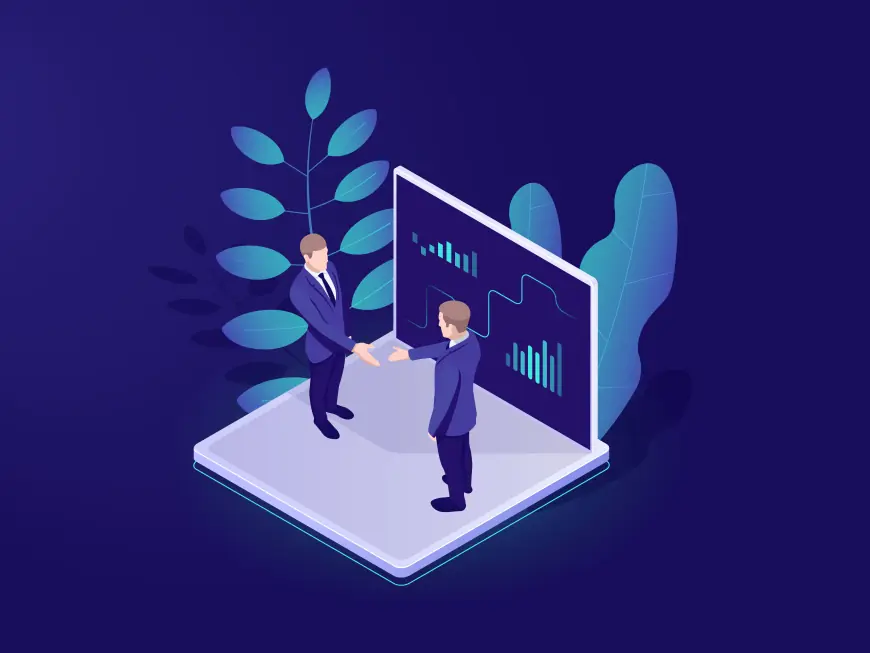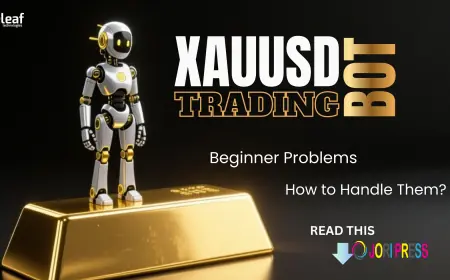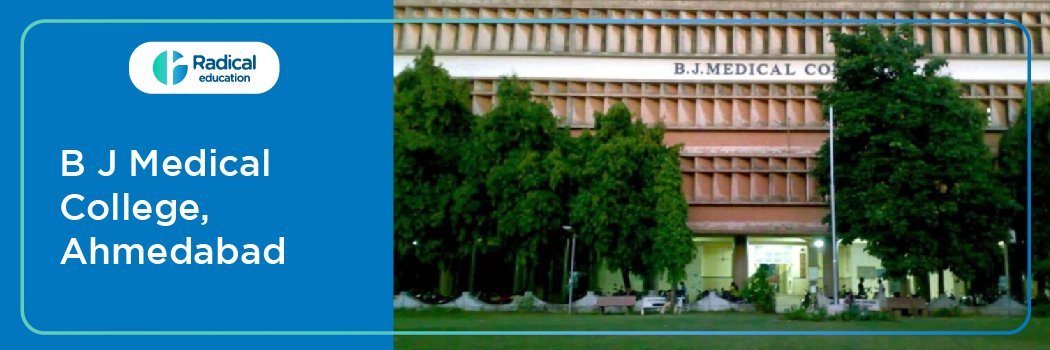RWA Tokenization: The Bridge Between Real Assets and Digital Capital
Discover how RWA tokenization connects real assets with digital capital, powered by Blockchain Development Services for a seamless financial future.

The global financial system is changing faster than ever before, driven by the growing integration of blockchain technology into real-world markets. Among its most promising developments is Real-World Asset (RWA) tokenization, a process that connects tangible assets with the digital financial landscape. As digital innovation moves from theory to practice, RWA tokenization has emerged as one of the most significant advancements, reshaping how investors, businesses, and governments handle value. It transforms traditional assets into programmable, tradable tokens on blockchain networks—essentially bridging real capital with decentralized digital infrastructure.
This evolution is more than just technological progress; it represents a structural transformation in asset management. By bringing real assets into digital ecosystems, tokenization enhances transparency, liquidity, and accessibility in markets that were once slow and fragmented. As enterprises around the world adopt Blockchain Development Services to support RWA projects, the foundation for a more interconnected and efficient investment environment is being set for the years ahead.
Understanding RWA Tokenization
RWA tokenization is the process of digitally representing ownership of real-world assets such as real estate, commodities, bonds, or intellectual property using blockchain tokens. These tokens function as official records of ownership that can be transferred instantly and securely between participants on a blockchain network.
Before tokenization, traditional asset trading required multiple intermediaries and faced both cost and operational delays. With blockchain, every transaction is logged on an immutable ledger and verified in real time by a distributed network of participants. This drastically reduces transaction friction, increases trust, and allows for programmable ownership models such as fractional participation.
Each token is backed by a verifiable real asset, reducing volatility and giving investors confidence in its underlying value. As a result, RWA tokens are gaining traction as a core component of next-generation financial infrastructure, connecting the stable world of traditional investment with the innovation and flexibility of blockchain technology.
Enterprises are now exploring tokenization with the help of the Best Blockchain Development Company to create ecosystems where both institutional and retail investors can transact with confidence. These companies bring technical expertise, smart contract frameworks, and blockchain auditing services to ensure that the representation of assets is both legally compliant and technologically secure.
Why Tokenizing Real Assets Makes Sense
Traditional finance has long relied on manual systems for recording ownership, processing transactions, and verifying asset-related data. These methods are not only time-consuming but also susceptible to errors and fraud. Tokenization changes this by digitizing the entire lifecycle of asset management—from issuance and ownership registration to secondary market trading.
By converting assets into blockchain tokens, businesses gain multiple operational benefits. Transactions become faster because blockchain allows instant peer-to-peer transfers without requiring brokers or clearinghouses. Settlement is automatic, reducing waiting times that previously lasted from days to weeks. Additionally, transparency is enhanced because all transactions and ownership changes are visible on a shared ledger open for verification.
One of the most practical outcomes of tokenization is the ease of fractional ownership. A large real estate project, for example, can be divided into thousands of smaller ownership tokens, making it accessible to a broader range of investors. This model expands liquidity for traditionally illiquid assets and increases capital participation in markets that were once restricted to institutional players.
Through high-quality Blockchain Development Services, these token ecosystems can be coded to include built-in compliance, revenue distribution, and automated governance features. The end result is a frictionless economy where assets move seamlessly across digital markets while retaining a direct connection to their underlying real value.
The Expanding Range of Tokenized Assets
The potential use cases of RWA tokenization are vast and continually expanding. Real estate remains one of the most prominent examples, as tokenization simplifies property trading and ownership management. Instead of time-consuming legal procedures, a blockchain-based token can represent partial ownership that can be exchanged instantly through digital wallets.
Similarly, commodities such as gold, silver, or oil can be digitized, allowing investors to trade fractional quantities without the need to store physical assets. Bonds and debt instruments are being transferred to tokenized systems to enable faster clearing and real-time yield distribution. Even intangible assets such as patents, carbon credits, and art are being integrated into blockchain networks for verification and liquidity generation.
Businesses and governments are realizing that by tokenizing these diverse asset classes, they create digital economies where value can flow freely with fewer barriers. This digital token infrastructure is increasingly supported by specialist technology partners offering Blockchain Development Services to ensure system interoperability and security.
The Best Blockchain Development Company enables this process by creating secure smart contracts that automatically enforce terms such as ownership transfers, dividend distributions, and redemption conditions. This consistent functionality assures both issuers and investors of reliability and efficiency, encouraging more institutions to adopt tokenized models.
Blockchain as the Foundation for Asset Trust
Blockchain technology forms the technical core of the tokenization process. It provides an immutable, tamper-proof system of record that ensures transactions cannot be altered retroactively. Every token represents a verifiable claim on a real asset, validated through smart contracts and secured by cryptographic mechanisms.
By embedding transparency into the system architecture, blockchain eliminates many of the risks associated with traditional asset management. Fraudulent activity, duplicate ownership, and record manipulation become nearly impossible because the ledger preserves every transaction permanently.
For investors, this transparency increases confidence, and for businesses, it reduces administrative costs tied to manual reconciliation and auditing. Blockchain also simplifies cross-border investments, as tokens can travel seamlessly between jurisdictions without dependence on conventional clearing frameworks.
To achieve this, organizations rely heavily on Blockchain Development Services that cover network integration, data security testing, and token standardization. A reliable development partner ensures that blockchain networks can handle large-scale data while maintaining speed and security. This is critical when financial institutions tokenize multi-million-dollar assets for global investors.
The Relationship Between RWA Tokenization and Liquidity
Liquidity has always been one of the biggest challenges in traditional markets. Large assets like commercial properties or infrastructure projects often sit idle because they are difficult to sell or divide. Tokenization changes that dynamic completely by enabling fractional ownership and 24/7 global trading.
Once an asset is represented on-chain, its corresponding tokens can be traded on decentralized platforms, introducing instant liquidity to markets that were previously slow-moving. This benefits both asset owners and investors—owners gain access to faster funding alternatives, while investors enjoy greater flexibility and exit options.
Blockchain’s transparent structure allows secondary market transactions to occur smoothly without complex approvals. Combined with real-time compliance checks coded into smart contracts, the token trading environment remains secure and regulated.
The Best Blockchain Development Company helps design liquidity systems that integrate tokens into decentralized exchanges (DEXs), crowdfunding platforms, or institutional marketplaces. These open networks connect buyers and sellers directly, eliminating any dependence on single centralized intermediaries. As these ecosystems mature, they will become the backbone of global liquidity transfer in digital finance.
How Blockchain Development Services Drive RWA Growth
Behind every successful RWA tokenization project is a robust technological foundation built by blockchain service providers. Blockchain Development Services include consulting, architecture design, smart contract programming, system integration, and security audits. Technological precision is crucial because the real-world value of tokenized assets depends on the reliability of their digital representation.
A complete development lifecycle begins with identifying the best blockchain network for the asset class—whether private, public, or hybrid. Engineers design token models that match the client’s business requirements and legal obligations. Smart contracts are then coded to manage creation, distribution, and transfer conditions.
The role of the Best Blockchain Development Company extends beyond technical delivery—it also includes strategy alignment. Developers help businesses understand governance models, regulatory requirements, and long-term scalability. For example, a company tokenizing real estate must account for local property laws, tax compliance, and investor rights. Blockchain developers embed these considerations into programmable code to prevent future legal complications.
Furthermore, advanced token management systems and analytics dashboards are often integrated to help issuers monitor asset performance and token holder activity. These solutions demonstrate how effective blockchain architecture can make even complex financial ecosystems operate with clarity and ease.
Improving Accessibility and Market Inclusion
Another major contribution of RWA tokenization is its impact on inclusivity. In traditional finance, access to high-value assets like real estate or infrastructure projects was reserved for institutional investors with significant capital reserves. By dividing these assets into smaller, affordable digital units, tokenization opens doors for retail investors worldwide.
This model not only broadens the investor base but also brings liquidity into markets that have been historically closed. Smaller investors can participate in large-scale projects while maintaining transparent records of their ownership. On the issuer side, companies gain access to wider funding sources without heavy reliance on a few large stakeholders.
Blockchain Development Services enable this inclusivity by ensuring easy integration between digital wallets, token marketplaces, and traditional financial systems. With secure onboarding systems and simplified interfaces, even non-technical users can engage in blockchain-based investments confidently.
The Best Blockchain Development Company helps clients design token sales platforms that emphasize user experience while maintaining compliance with global standards. Simplified participation enhances adoption rates among both retail and institutional investors, accelerating the growth of tokenized financial ecosystems.
The Regulatory Alignment of Tokenized Assets
One of the earliest challenges facing RWA tokenization involved regulatory uncertainty. Governments were cautious in approving blockchain-based financial instruments due to risks around money laundering and investor protection. Over time, this concern has been addressed through clearly defined guidelines integrating blockchain operations within existing financial frameworks.
Regulatory compliance is now becoming an integral feature of token design. Smart contracts can enforce restrictions like jurisdictional limitations or identity verification. Blockchain Development Services often include compliance mechanics that automatically uphold regulations such as know-your-customer (KYC) and anti-money-laundering (AML) standards.
The Best Blockchain Development Company ensures that tokenization platforms conform to these legal expectations with built-in safety protocols. This not only helps instill investor trust but also encourages institutional involvement, which is crucial for market scalability. Regulatory progress and technological advancement together create the stable environment required for tokenized finance to become mainstream.
The Broader Implications for Global Finance
RWA tokenization is driving a fundamental redefinition of global finance. It merges the stability of traditional assets with the flexibility of blockchain networks. This combination offers unparalleled efficiency, security, and inclusivity. Tokenized systems enable real-time settlements, international capital movement, and higher market liquidity—all without compromising transparency.
The spread of tokenization will gradually standardize blockchain technology across global economic sectors. As financial institutions, governments, and corporations adopt tokenized models, a hybrid architecture of decentralized and centralized systems will emerge. Wallet-based ownership and blockchain-verified transactions will coexist with traditional finance under regulatory supervision.
In this context, the Best Blockchain Development Company plays a leadership role, shaping the ecosystem through reliable Blockchain Development Services that merge compliance with innovation. These firms are not only developing code but building infrastructure that will define the future structure of global financial systems.
The Future of RWA Tokenization and the Digital Economy
Looking forward, the potential for RWA tokenization reaches beyond finance into nearly every form of asset ownership. It will influence how supply chains authenticate products, how governments record land ownership, and how companies raise capital. Over the next few years, as blockchain integration continues to expand, the concept of owning and trading physical assets will evolve into an experience that is faster, more transparent, and globally accessible.
The combination of blockchain’s technical strength with real-world value creation marks a turning point for digital transformation. By enabling blockchain-based asset verification, custody, and transfer, RWA tokenization makes it possible for businesses to operate across borders with minimal barriers.
Companies that engage early with Blockchain Development Services will gain a competitive edge in efficiency and capital mobilization. Those partnering with the Best Blockchain Development Company can confidently move into the tokenized economy with resilient infrastructures capable of adapting to continuous regulatory and market shifts.
RWA tokenization is building a bridge between physical and digital capital that will permanently reshape how the world interacts with finance. The rapid convergence of blockchain networks, asset-backed tokens, and cross-industry innovation indicates that a new era of digital ownership is well underway. The transformation of assets into tokenized form is not a passing trend—it is the foundation of a financial system that is secure, open, and accessible to all.
What's Your Reaction?
 Like
0
Like
0
 Dislike
0
Dislike
0
 Love
0
Love
0
 Funny
0
Funny
0
 Angry
0
Angry
0
 Sad
0
Sad
0
 Wow
0
Wow
0
















































